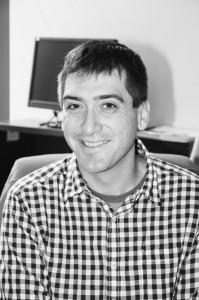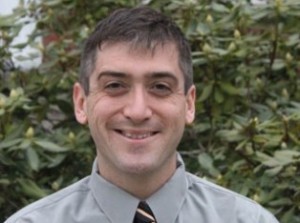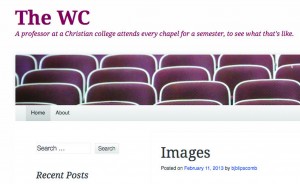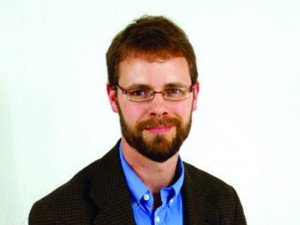“I’m very intentional about talking about worship as rooting us in a bigger story,” Dean Michael Jordan said after settling into his office chair. This story is the larger Christian story, but it is also Houghton’s story.”
 Although the morning was quite chilly, Jordan wore flip-flops with his suit coat, adding to the informal, yet intimate nature of the conversation. “It really occurred to me how lonely people are in general,” Jordan said, going on to talk about the pressure on students at a Christian college and how they feel the need to find God’s will for their lives and to be confident in their spiritual walks when, quite frankly, some are not. Jordan said, “Chapel is about connecting students and helping them see you’re not alone.” Therefore, Jordan hopes that chapel will serve the function of binding people together in a Christian community through worship.
Although the morning was quite chilly, Jordan wore flip-flops with his suit coat, adding to the informal, yet intimate nature of the conversation. “It really occurred to me how lonely people are in general,” Jordan said, going on to talk about the pressure on students at a Christian college and how they feel the need to find God’s will for their lives and to be confident in their spiritual walks when, quite frankly, some are not. Jordan said, “Chapel is about connecting students and helping them see you’re not alone.” Therefore, Jordan hopes that chapel will serve the function of binding people together in a Christian community through worship.
One of the ways the community comes together is through music. After praising the Philadelphia Eagles in one of his recent chapel talks, Jordan mentioned his desire for the college to be fluent in three forms of worship: hymns, contemporary Christian songs, and Gospel music. In doing so, Jordan said his ultimate goal is to help students “love a breadth of Christian music and to be a grateful participant [as] one.”
His plan seems to be successful judging by the ovation the Gospel choir regularly receives, and the heartfelt singing accompanying hymns such as “Be Thou My Vision.”
“We should ask questions about worship and how each contributes to the service”, he stated. In this way, Jordan believes we can see the value in each form of worship and how all are used to bring God praise by the various church backgrounds represented by Houghton students.
In addition to music, chapel speakers and their messages are an important topic of discussion on chapel days. As he leaned back in his desk chair, Jordan explained that he chooses chapel speakers in collaboration with the Spiritual Life Committee; they select speakers by looking for people who will share topics they believe are important to the community and ones that will build connections to the outside world. For example, Dr. Lenny Luchetti who spoke in early October came from Wesley Seminary, representing both one of Houghton’s sister schools and a reputable seminary for graduate work. Also vital to picking chapel speakers is finding people Jordan referred to as understanding the difference between teaching and preaching. He elaborated on this distinction as the knowledge of when to present facts and when to realize the urgency of a message, and his or her need to make their intent clear and accessible to the audience, in this case, the Houghton community. One of Jordan’s regrets from his time as a Houghton student is that the speakers sometimes lacked this urgency, so he hopes that now chapel speakers will be able to provide that clarity. On days when Jordan speaks in chapel, the passion he has in presenting God’s word and drawing people together in Christ is palpable, evidenced by post-chapel conversations around campus.
In between his duties as chaplain, SPOT engagements, and family dinners in the cafeteria, Jordan works hard to make chapel the spiritual center of campus life. He hopes that students will stop thinking of chapel as a duty someone has forced them to fulfill; rather, over time chapel will form and shape student if they give themselves to it, he said before taking a sip from his coffee mug. If one does this, Jordan said, one will realize that “taking that time really helped me to look at God differently and understand myself differently and to root me in a community that I wouldn’t have been otherwise.”



